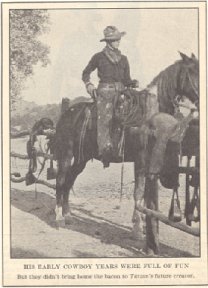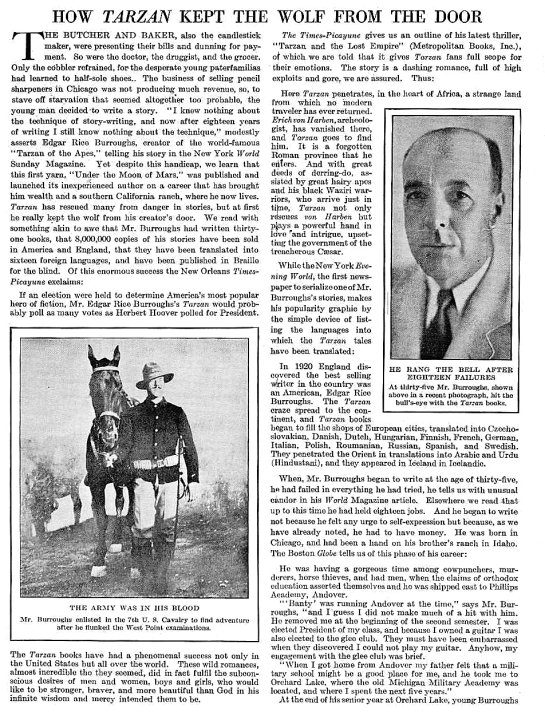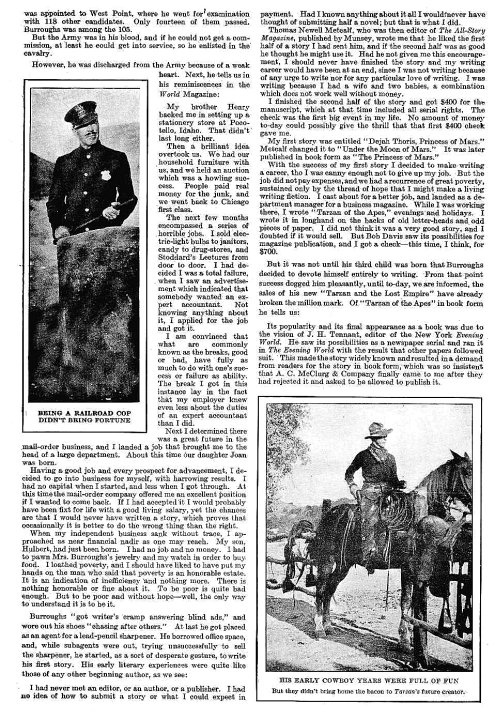
Official Edgar Rice Burroughs Tribute Site
Since 1996 ~ Over 15,000 Webpages in Archive
Volume 0055
HOW TARZAN® KEPT THE
WOLF FROM THE DOOR
The Literary Digest - November 30, 1929

The butcher and baker, also the candlestick maker, were presenting their bills and dunning for payment. So were the doctor, the druggist, and the grocer. Only the cobbler refrained, for the desperate young paterfamilias had learned to half-sole shoes. The business of selling pencil sharpeners in Chicago was not producing much revenue, so, to stave off starvation that seemed altogether too probable, the young man decided to write a story. "I knew nothing about the technique of story-writing, and now after eighteen years of writing I still know nothing about the technique," modestly asserts Edgar Rice Burroughs, creator of the world-famous "Tarzan of the Apes," telling his story in the New York World Sunday Magazine. Yet despite this handicap, we learn that this first yarn, "Under the Moons of Mars," was published and launched its inexperienced author on a career that has brought him wealth and a southern California ranch, where he now lives. Tarzan has rescued many from danger in stories, but at first he really kept the wolf from his creator's door. We read with something akin to awe that Mr. Burroughs had written thirty-one books, that 8,000,000 copies of his stories have been sold in America and England, that they have been translated into sixteen foreign languages, and have been published in Braille for the blind. Of this enormous success the New Orleans Times-Picayune exclaims:
If an election were held to determine America's most popular hero of fiction, Mr. Edgar Rice Burroughs's Tarzan would probably poll as many votes as Herbert Hoover polled for President. The Tarzan books have had a phenomenal success not only in the United States but all over the world. These wild romances, almost incredible tho they seemed, did in fact fulfill the subconscious desires of men and women, boys and girls, who would like to be stronger, braver, and more beautiful than God in his infinite wisdom and mercy intended them to be.
The Times-Picayune gives us an outline of his latest thriller, "Tarzan and the Lost Empire," Metropolitan Books, Inc., of which we are told that it gives Tarzan fans full scope for their emotions. The story is a dashing romance, full of high exploits and gore, we are assured. Thus:
Here Tarzan penetrates, in the heart of Africa, a strange land from which no modern traveler has ever returned. Erich von Harben, archeologist, has vanished there, and Tarzan goes to find him. It is a forgotten Roman province that he enters. And with great deeds of derring-do, assisted by great hairy apes and his black Waziri warriors, who arrive just in time, Tarzan not only rescues von Harben but plays a powerful hand in love and intrigue, upsetting the government of the treacherous Caesar.
While the New York Evening World, the first newspaper to serialize one of Mr. Burroughs's stories, makes his popularity graphic by the simple device of listing the languages into which the Tarzan tales have been translated.
In 1920 England discovered the best selling writer in the country was an American, Edgar Rice Burroughs. The Tarzan craze spread to the continent, and Tarzan books began to fill the shops of European cities, translated into Czechoslovakian, Danish, Dutch, Hungarian, Finnish, French, German, Italian, Polish, Roumanian, Russian, Spanish, and Swedish. They penetrated the Orient in translations into Arabic and Urdu (Hindustani), and they appeared in Iceland in Icelandic.
When, Mr. Burroughs began to write at the age of thirty-five, he had failed in everything he had tried, he tells us with unusual candor in his World Magazine article. Elsewhere we read that up to this time he had held eighteen jobs. And he began to write not because he felt any urge to self-expression but because as we have already noted, he had to have money. He was born in Chicago, and had been a hand on his brother's ranch in Idaho. The Boston Globe tells us of this phase of his career.
He was having a gorgeous time among cowpunchers, murderers, horse thieves, and bad men, when the claims of orthodox education asserted themselves and he was shipped east to Phillips Academy, Andover.
"'Banty' was running Andover at the time," says Mr. Burroughs, "and I guess I did not make much of a hit with him. He removed me at the beginning of the second semester. I was elected President of my class, and because I owned a guitar I was elected to the glee club. They must have been embarrassed when they discovered I could not play my guitar. Anyhow, my engagement with the glee club was brief.
"When I got home from Andover my father felt that a military school might be a good place for me, and he took me to Orchard Lake, where the old Michigan Military Academy was located, and where I spent the next five years."
At the end of his senior year at Orchard Lake young Burroughs was appointed to West Point, where he went for examination with 118 other candidates. Only fourteen of them passed. Burroughs was among the 105.
But the Army was in his blood, and if he could not get a commission, at least he could get into the service, so he enlisted in the cavalry.
However, he was discharged from the Army because of a weak heart. Next, he tells us in his reminiscences in the World Magazine:
My brother Henry backed me in setting up a stationery store at Pocotello, Idaho. That didn't last long either.
Then a brilliant idea overtook us. We had our household furniture with us, and we held an auction which was a howling success. People paid real money for the junk, and we went back to Chicago first class.
The next few months encompassed a series of horrible jobs. I sold electric-light bulbs to janitors, candy to drug-stores, and Stoddard's Lectures from door to door. I had decided I was a total failure, when I saw an advertisement which indicated that somebody wanted an expert accountant. Not knowing anything about it, I applied for the job and got it.
I am convinced that what are commonly known as the breaks, good or bad, have fully as much to do with one's success or failure as ability. The break I got in this instance lay in the fact that my employer knew even less about the duties of an expert accountant than I did.
Next I determined there was a great future in the mail-order business, and I landed a job that brought me to the head of a large department. About this time our daughter Joan was born.
Having a good job and every prospect for advancement, I decided to go into business for myself, with harrowing results. I had no capital when I started, and less when I got through. At this time the mail-order company offered me an excellent position if I wanted to come back. If I had accepted it I would probably have been fixt for life with a good living salary, yet the chances are that I would never have written a story, which proves that occasionally it is better to do the wrong thing than the right.
When my independent business sank without a trace, I approached as near financial nadir as one may reach. My son, Hulbert, had just been born. I had no job and no money. I had to pawn Mrs. Burroughs's jewelry and my watch in order to buy food. I loathed poverty, and I should have liked to have put my hands on the man who said that poverty is an honorable estate. It is an indication of inefficiency and nothing more. There is nothing honorable or fine about it. To be poor is quite bad enough. But to be poor and without hope -- well, the only way to understand it is to be it.
Burroughs "got writer's cramp answering blind ads," and wore out his shoes "chasing after others." At last he got placed as an agent for a lead-pencil sharpener. He borrowed office space and, while subagents were out, trying unsuccessfully to sell the sharpener, he started as a sort of desperate gesture, to write his first story. His early literary experiences were quite like those of any other beginning author, as we see:
I had never met an editor, or an author, or a publisher. I had no idea of how to submit a story or what I could expect in payment. Had I known anything about it all I would never have thought of submitting half a novel; but that is what I did.
Thomas Newell Metcalf, who was then editor of the All-Story Magazine, published by Munsey, wrote me that he liked the first half of a story I had sent him, and if the second half was as good he thought he might use it. Had he not given me this encouragement, I should never have finished the story and my writing career would have been at an end, since I was not writing because of any urge to write nor for any particular love of writing. I was writing because I had a wife and two babies, a combination which does not work well without money.
I finished the second half of the story and got $400 for the manuscript, which at that time included all serial rights. The first check was the first big event in my life. No amount of money to-day could possibly give the thrill that that first $400 check gave me.
My first story was entitled "Dejah Thoris, Princess of Mars." Metcalf changed it to "Under the Moons of Mars." It was later published in book form as "The Princess of Mars."
With the success of my first story I decided to make writing a career, tho I was canny enough not to give up my job. But the job did not pay expenses, and we had a recurrence of great poverty, sustained only by the thread of hope that I might make a living writing fiction. I cast about for a better job, and landed as a department manager for a business magazine. While I was working there, I wrote "Tarzan of the Apes," evenings and holidays. I wrote it in longhand on the backs of old letter-heads and odd pieces of paper. I did not think it was a very good story, and I doubted if it would sell. But Bob Davis saw its possibilities for magazine publication, and I got a check -- this time, I think, for $700.
But it was not until his third child was born that Burroughs decided to devote himself entirely to writing. From that point success dogged him pleasantly, until to-day, we are informed, the sales of his new "Tarzan and the Lost Empire" have already broken the million mark. Of "Tarzan of the Apes" in book form he tells us:
Its popularity and its final appearance as a book was due to the vision of J. H. Tennant, editor of the New York Evening World. He saw its possibilities as a newspaper serial and ran it in the Evening World with the result that other papers followed suit. This made the story widely known and resulted in a demand from readers for the story in book form, which was so insistent that A. C. McClurg & Company finally came to me after they had rejected it and asked to be allowed to publish it.

His early cowboy years were full of fun.
But they didn't bring home the bacon to Tarzan's future creator.


![]()
![]()

![]()
BILL
HILLMAN
Visit
our thousands of other sites at:
BILL
and SUE-ON HILLMAN ECLECTIC STUDIO
ERB
Text, ERB Images and Tarzan® are ©Edgar Rice Burroughs, Inc.-
All Rights Reserved.
All
Original Work ©1996-2010/2018 by Bill Hillman and/or Contributing
Authors/Owners
No
part of this web site may be reproduced without permission from the respective
owners.